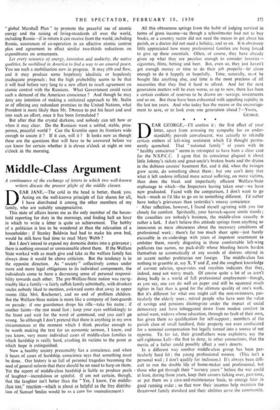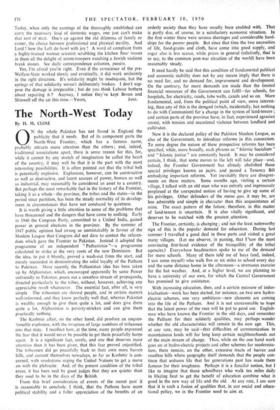Middle-Class Argument
4 continuance of the exchange of letters in which two well-known writers discuss the present plight of the middle classes.
DEAR JANE,—The cold in -the head is better, thank you. Acting on the well-known principle of fair shares for all, I have distributed it among, the other members of my family, who are suitably unappreciative.
This state of affairs leaves me as the only member of the house- hold reporting for duty in the mornings, and finding half an hour in which to write a letter- is quite an achievement. The hobby of a politician is less to be wondered at than the relaxation of a householder ; if Stanley Baldwin had had to make his own bed, would he still, have had time to read Mary Webb ?
But I don't intend to expand my domestic duties into a grievance ; there is nothing unusual or unreasonable about them. If the Welfare State worked with as much give and take as the welfare family has always done it would be above criticism. But the tendency is in the opposite direction. As " society "' collectively comcs under more and more legal obligations to its individual components, the individuals come to have a decreasing sense of personal responsi- bility towards each other. The pre-Welfare-State nation was recog- nisably like a family—a fairly raffish family admittedly, with drunken uncles nobody liked to mention, awkward aunts shut away in upper rooms (like Mit Rochester), and no end of prdblem children. But the Welfare-State nation is more like a company of foot-guards on parade: if one guardsman drops his rifle—take his name ; if another faints—the rest stand fast ; keep your eyes unblinkingly to the front and wait for the word of command, and you can't go wrong. So although I don't pretend that there is anything in my own circumstances at the moment which I: think peculiar enough to be worth making the text for an economic sermon, 1 know, and you know, very many individual cases of middle-class families in which hardship is really hard, crushing its victims to the point at which hope is extinguished.
Now a. healthy society presumably has a conscience, and when it hears of cases of hardship, conscience says that something must be done.. Our history is so full of personal tragedies becoming the seed of general reform that there should be no need to harp on them. Yet the report of middle-class hardshi$ is liable to produce peals of laughter—incredulous or spiteful. (I am not certain, though, that the laughter isn't better than the " Yes, I know, I'm middle- class too," reaction—which is about as helpful as the free distribu- tion of Samuel Smiles would be as a cure for nnemoloyment.) All this obtuseness springs from the habit of judging survival in terms of gross income.--as though a schoolmaster had not to buy books, or a country rector did not need the means to get about his parish, or a doctor did not need a holiday, and so on. It is obviously little appreciated how many professional families are being forced to give up these essentials. Often, of course, they have already given up what they are peculiar enough to consider luxuries— cigarettes, films, betting and beer. But, even so, they just haven't got enough money or time to do their job properly—let alone enough to do it happily or hopefully. Time, naturally, ma;fi be bought like anything else, and time is the most precious of all necessities that they find it hard to afford. And for the next generation matters will be even worse, as up to now, there has been a certain cushion of reserves to be drawn on—savings, investments and so on. But these have been exhausted with appalling rapidity in the last ten years. And who today has the means or the encourage- ment to save, or to look even one generation ahead ?—Yours,
GEORGE.
* * * *
DEAR GEORGE,—I'll confess it ; the first effect of your letter, apart from arousing my sympathy for an under- standably peevish convalescent, was actually to rekindle certain embers of left-wing sentiment which I'd thought perma- nently quenched. That " national family " of yours with its "healthy conscience " seems in retrospect to have been a clear case for the N.S.P.C.C. I agree that its conscience plagued it about little Johnny's rickets and great-uncle's broken boots and-the drains in the dubious cousins' basement flat, and it did, when the twinges grew acute, do something about them ; but one can't deny that what it left undone inflicted more actual suffering, on more victims, than does the bleak and imperfectly efficient Welfare-State orphanage to which—the Inspectors having taken over—we have now graduated. Faced with the comparison, I don't want to go back—much as l'd like to go on to something different. I'd rather have today's grievances than yesterday's uneasy conscience.
- After reflection, however, I found myself agreeing with you too closely for comfort. Spiritually, your barrack-square simile stands ; the casualties are nobody's business, the middle-class casualty is rather a lark. I don't believe this attitude springs from anything so innocuous as mere obtuseness about the necessary conditions of professional work ; there's far too much sheer spite—just barely excusable in ex-underdogs with years of impotent resentment to embitter them, merely disgusting in those comfortable left-wing publicists (no names, no pack-drill) whose bleeding hearts harden themselves so automatically at any sounds of distress uttered in an accent neither proletarian nor foreign. The middle-class has nothing to grumble at, say X, Y and Z, and the roughest knowledge of current salaries, space-rates and royalties indicates that they, indeed, need not worry much. Of course quite a lot of us aren't doing badly in a world of full professional employment—though, as you say, one can do well on paper and still be squeezed much tighter in fact than is good for the ultimate quality of one's work. But it's different for what one might call the non-swimmers, par- ticularly the elderly ones ; retired people who have seen the value of savings and pensions disintegrate under the impact of social democracy and have tobogganed down from modest comfort to actual want, widows whose education, through no fault of their own, has given them no qualification for self-support ; members of the pariah class of small landlord, their property not even confiscated for a nominal compensation but legally turned into a source of net ekpense. Tit for tat, their grandfathers were exploiters, say the self-righteous Left—the first to deny, in other connections, that the merits of a father could possibly affect a son's deserts.
In a different way another middle-class group has been par- ticularly hard hit : the young professional women. (This isn't a personal wail ; I don't qualify for inclusion.) It's always been diffi- cult to run the double life of home-maker and professional, but those who got through their " nursery years " before the war could at least, during those years, keep their careers ticking over, part-time, or put them on a care-and-maintenance basis, to emerge later in good running order ; so that now their incomes help maintain the threatened family standard and their abilities serve the community. Today, when only the earnings of the thoroughly established can carry the necessary load of domestic wages, one just can't make that sort of start. One's up against the old dilemma of family or career, the choice between professional and physical sterility. And Lord ! how the Left do howl with joy ! A word of complaint from a highly-trained woman scientist scrubbing the kitchen floor rouses in them all the delight of storm-troopers watching a Jewish violinist break stones. See daily correspondence columns, passim.
Yes, I'm afraid you're right. Even if the conscience of the pre- Welfare-State worked slowly and erratically, it did work uniformly in the right direction. It's solidarity might be inadequate, but the springs of that solidarity Weren't deliberately broken. I don't sup- pose the damage is irreparable ; but do you think Labour bothers about repairing it ? Anyway, I notice they've kept Bevan and Shinwell off the air this time.—Yours, JANE.



































 Previous page
Previous page